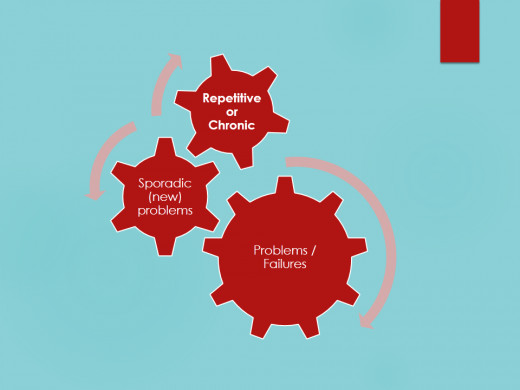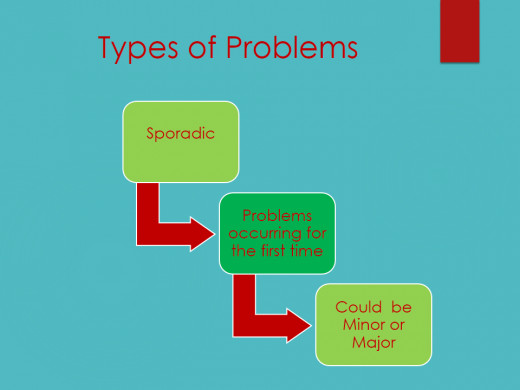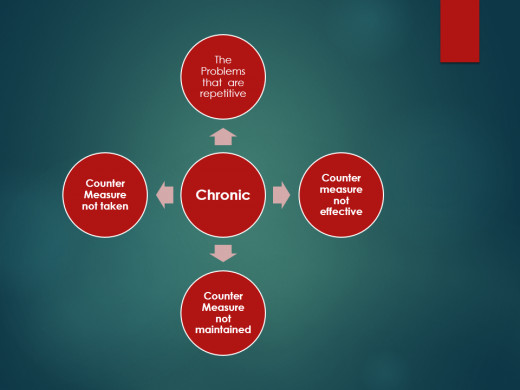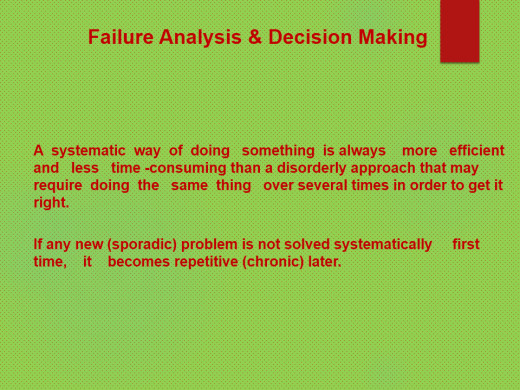Failure or Problem Analysis - Watanabe Model
Traditional view of Failures
Traditional mind set about Problem/ Failures is Embarrassment, Degradation, Discredit, Disrepute, Mistakes, Weak Points, and Blemishes etc. Naturally people tend to cover up or hide their problems.
But the ideal view is exactly the opposite. It tells that Problems are equivalent to Mountains of treasure. Our problems show us how much room for improvement we have.
We are encountering failures almost every day in every aspect of activity. Most of them go un-noticed, but the major ones affect us so badly that the idea of failure clouds our mid set and prevents it from making the right decision at the right time.
Let us first digest the fact that failures are not targeting us, but we target it and make the failures possible. We as a whole are responsible for such failures and we also let the failures repeatedly attack and affect us.
So, how to eliminate failures from our life and stop it from getting repeated?
Watanabe devised a model for failure analysis and prevention.The model was first successfully implemented by TOYOTA and now the model has become a back bone for TPM ideology. If you wonder what is TPM, it is one single concept that revolutionising the manufacturing industry in the world.
According to Watanabe’s model, Failures are classified into Sporadic (new) and Chronic (repetitive) problems.
Sporadic are the problems occurring for the first time. There problems could be Major or Minor.
Being late to college is a major problem.
You reached exactly on time but had wanted to reach 5 minutes earlier.
Implications are more in Major Problems and less in Minor Problems. But both the problems or failures have to be analysed in a systematic manner as explained to get into the root of the problem.
If the Failure or Problem gets repeated, then it is called Chronic Problem
Types of Problems

Sporadic Problems

Failure Analysis - Sporadic
Analysing a Sporadic Problem:
There are some questions one has to ask while analysing a problem to get into its root.
When the problem occurred ?
What is the Problem ?
Where the problem occurred ?
Who is the witness for the problem?
Why the problem has happened? And
How the problem happened?
After answering all the above questions, you will have to start a ‘Why’ analysis. Let me explain this with a simple example:
‘Why’ Analysis:
I went to college late last Tuesday.
Why?
I missed the College bus.
Why?
I started late from my house?
Why?
I overslept.
Why?
I slept late the previous night.
Why?
I was watching a movie?
So, the reason for my delay had ultimately squared up at a movie.
What is the solution then?
Do not watch movie in the late nights.
Chronic or Repetitive Problems

Chronic or Repetitive Problems
Analysing a repetitive / Chronic Problem:
If you encounter a problem or a failure you will have to take counter measures to ensure that the problem / failure never gets repeated again. There are three conditions that influence repetition of problems or failures:
- Counter Measure not taken:
You have taken the problem lightly and had not taken any counter measures.
- Counter measure not effective:
You have taken a counter measure but that is not effective enough to prevent repetition.
To avoid being late, you have decided to keep an Alarm in place so that you can get up early to catch the college bus. But the root cause of sleeping late at night resulted in not waking up even after the Alarm sounded.
The solution here is to modify the counter measure to prevent such occurrences.
- Counter Measure not maintained:
You have devised the correct counter measure but have not maintained it. You have made the failure Analysis correctly and devised the right counter measure but you have not maintained it.
You have understood that the root cause for this problem is sleeping late at night which happens when you see a late night movie. Since the first occurrence of failure, you have carefully avoided sleeping late at night. But on the said day, one of your close friends had insisted you to watch a late night movie and so have not maintained the counter measure.
Decision Making

Systematic way of doing things
Systematic way of doing things is always more efficient and less time -consuming than a disorderly approach that may require doing the same thing over several times in order to get it right.
Even though I have tried to present the Watanabe Model for analysing the individual’s failures, the theory was originally proposed for industries. Almost most of the manufacturing industries in India are opting for TPM to optimise their target, production and profit. Let me write about what is TPM, How is it implemented and the results achieved. Believe me it is a vast subject and I may not be able to present the entire subject in a single presentation.








